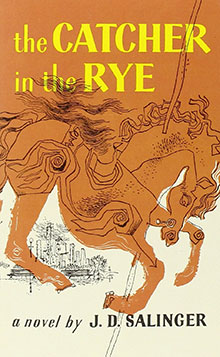 I didn’t even ask why I was turning into Holden Caulfield. I was fifteen, a brochure girl for postwar innocence. And I was a farm kid, three thousand miles away from Holden’s Manhattan; I took violin lessons, rode my bike through orchards, memorized social studies facts, picked strawberries to make money, earned Camp Fire Girl honor beads. I also sought the right bras, the right pimple medicine, the boys most likely to alarm my family.
I didn’t even ask why I was turning into Holden Caulfield. I was fifteen, a brochure girl for postwar innocence. And I was a farm kid, three thousand miles away from Holden’s Manhattan; I took violin lessons, rode my bike through orchards, memorized social studies facts, picked strawberries to make money, earned Camp Fire Girl honor beads. I also sought the right bras, the right pimple medicine, the boys most likely to alarm my family.
The Catcher in the Rye came into my life at a rummage sale, and I read it in one evening. Within the next few days, I heard myself reciting whole paragraphs from memory, and in doing so I began to notice that I was driving nearly everyone away. My usually affectionate family loathed Holden and me enough to shoot scornful looks over to our side of the dinner table and forget to pass us the potatoes. It went on for months.
The gender difference didn’t occur to me.
Why not? I now ask myself. Didn’t it seem really, really, really odd that I was this boy who was hanging Sunny’s sad green dress on a hanger in a New York hotel room? I don’t think I gave it a thought.
I look back on whom I was choosing to be: an academic failure who had done nearly everything wrong that he’d been asked to do right; a boy who was making his own journey into the underworld and taking meticulous note of its sinister mien; a narrator whose flair for vulgarity was almost choral and who was intimately attuned to the sanctity of life; a solitary wanderer who, like many teenagers, was just learning how to take the full measure of his undisciplined temperament; a protagonist who wanted to save falling children and who was saved by his little sister; a borrower and a lender who was teaching me about responses to defilement, a lesson I would continue to need as the beleaguered twentieth century stumbled forward.
Somehow I’ve gotten through the intervening years without ever examining whether or not I was unconsciously seeking a gender change (no, I was not), whether or not I had penis envy, whether or not I wanted to try on boyhood. But as I ask these questions even now, it seems that it was a literary identification of convenience. Getting to be Holden let me use his brain, which was so much more interesting than mine. When I was Holden, I had form, shape, demeanor. He gave me someone to be.
I had loved living with Betsy and Tacy, had enjoyed bustling around solving mysteries with Nancy Drew, but I hadn’t become them. They were book friends, and they didn’t give my mother the migraines that my immersion in Holden’s life gave her.
What I do know at this distance: Holden was teaching me about structure and narration, about the subjectivity, the turn-on-a-dime bias inherent in fiction. I had heard certain kinds of storytelling all my life. His kind was new, alluring in its impertinence, the perfect vehicle for me to use as an armored car in an adolescence that really didn’t need one. And there was a poignant gravity to Holden that has never left me. Could I have guessed that the mere mention of his name could still upset people, all these decades later? Not a bit.
As a grownup reader I love the sweet agony of becoming Jane Eyre, Clarissa Dalloway, Natalie Babbitt’s Winnie Foster, and some of Alice Munro’s exquisitely sculpted characters. But I think my early subversive partnership with Holden has also made it possible for me to come closer to becoming David Copperfield, Jerry Renault, Jesse Aarons, Will Parry, King Lear, and my favorite, Gogol’s Akaky Akakievich Bashmachkin. Holden let me sneak briefly into the guys’ clubhouse, and I’ll always be grateful.
[This article first appeared in The Horn Book in 2007. It is republished here with the author’s permission.]

Thank goodness for books that allow us to be so many different people. A wonderful article, Virginia.
Gosh, thank you, David. And the books that take us into them so early in our lives set the bar very, very high, don’t they? May we all keep reading as if our lives depended on it in these strained times.